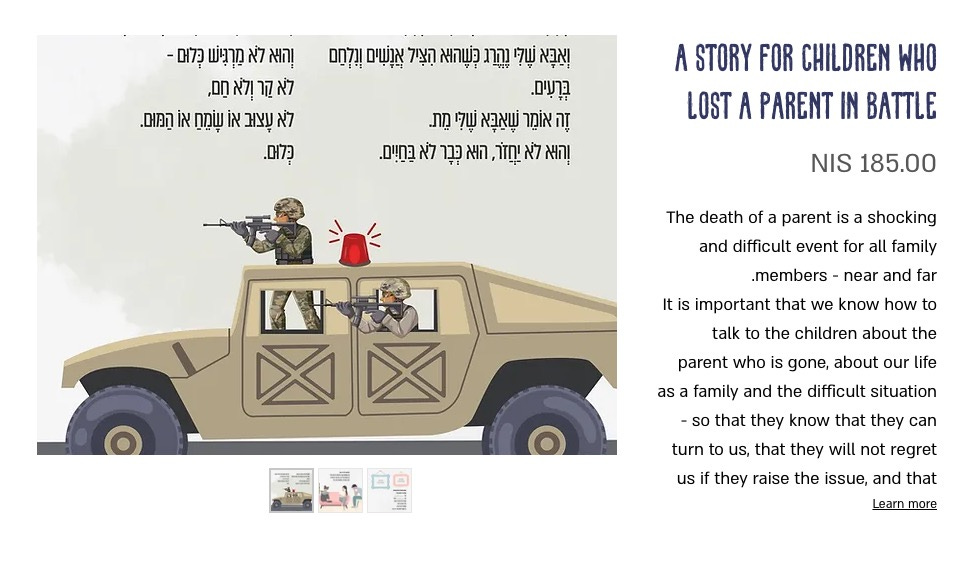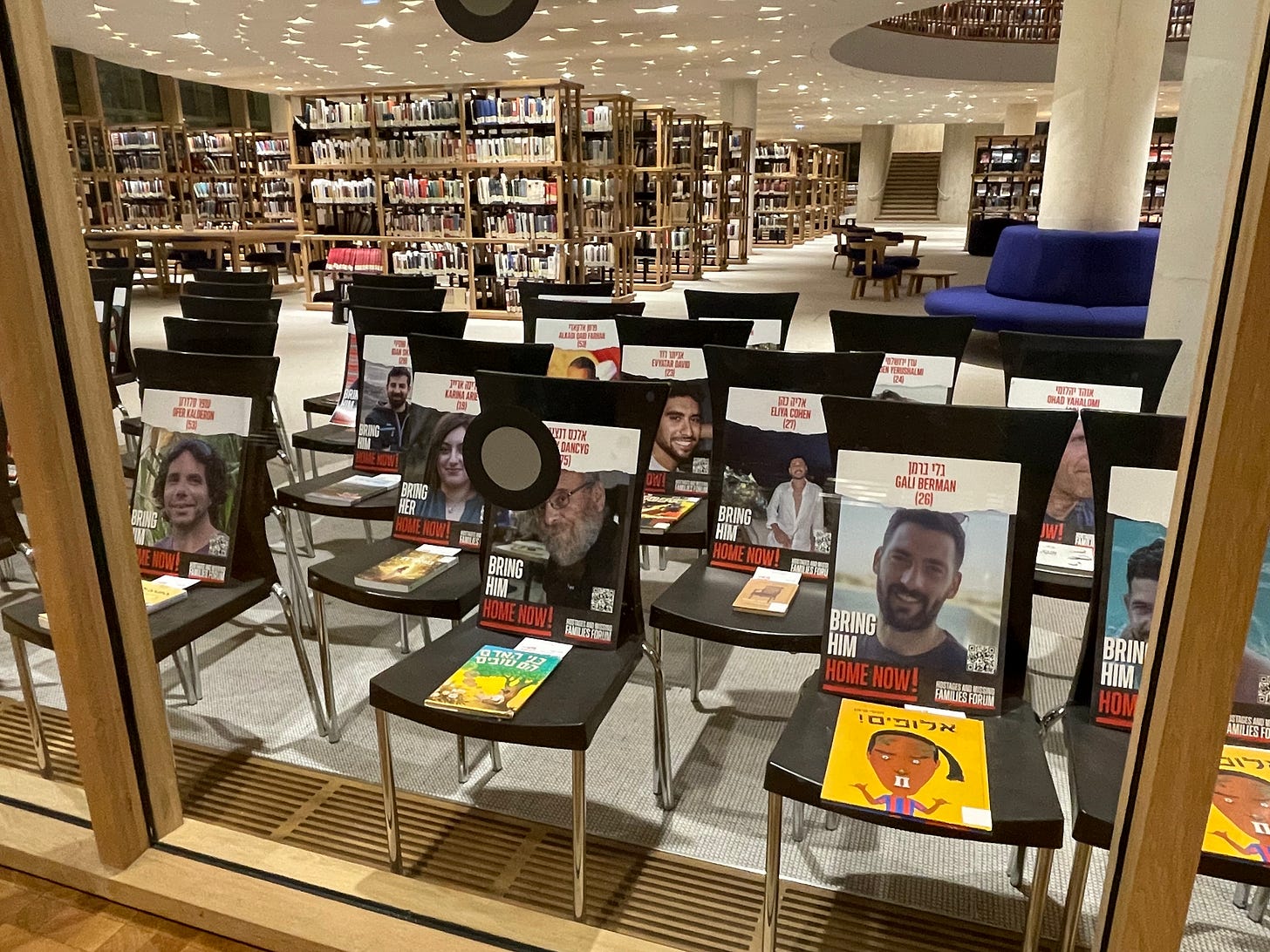"I honestly don't know how you are all still standing ..."
With lots of people coming through Jerusalem this summer, we're seeing friends and colleagues. Many of them say, "I knew, of course. But I didn't really get it until I got here."
There are virtually no tourists here. Our tour-guide friends, the occasional taxi driver and others all say the same thing. “There’s no work to be had.”
But this is still Jerusalem in the summer, so innumerable groups of Jewish professionals are here, for this conference or that. It’s nice—it gives us a chance to see many friends and colleagues we haven’t seen in a long time.
I participated in one such conference, an international gathering of Jewish writers. It was scheduled to be three days of talking not about war, but about writing. Sessions like “Where we Write from Now—Jewish Literature as a Portable Homeland” or “Craft in the Aftermath.” That sort of thing —would be good for the soul, I thought. Something different. And I had friends from abroad who were going to attend, so I was looking forward to it even more.
We were only one session in, a panel discussion with four professors who’d taught Jewish literature and related subjects on American college campuses this year, with their reflections on the new challenges. It was a session about literature, Jewish and Israeli writing, and students in today’s environment in America. No one so much as uttered the word “Nova.” Or “Be’eri.” Or “hostages.” Or “Kfar Aza.” Those weren’t the topic, and no one went there.
Until the Q&A, that is. After a few perfectly fine and interesting questions, someone I didn’t know said something like, “I cannot believe we’re been sitting here this long, and no one has even mentioned the innocent Gazans who’ve been killed.”
For a moment, I wasn’t sure I’d heard correctly. We hadn’t mentioned Jews or Israelis who’d been killed. Or kidnapped. Or raped. We were talking about teaching literature in America.
But it didn’t matter. The floodgates opened, with a series of mea maxima culpa’s from numerous people. Literature was left in the dust, and all of a sudden, we were talking about how Israel’s conduct of the war was causing the participants great pain. The participants from abroad, that is. I don’t recall a single Israeli making a comment during this discussion.
There’s obviously nothing wrong with talking about the pain that this war is causing us, but to be honest, I don’t have space in my soul for conversations that don’t even acknowledge our pain, our losses, and with our kids called up and at war, our dread. Even if we’ll eventually get to “them,” which we well should, we can’t at least start with us?
No, it seemed, we can’t.
A while later, it was time for a coffee break. As people got up, I realized that my entire being felt sad. Or like there wasn’t enough oxygen in the room. This wasn’t going to be a healthy place (for me) to be, so I practiced the “self care” my American friends’ kids talk about all the time. When the room was mostly empty, I gathered my stuff and quietly sneaked out the side.
I didn’t go back. Or, I should say, I just couldn’t go back. My reserves are too depleted.
We were at a concert last night (more on which below), when I realized that there was a friend—a very well known American Jewish author—who’d been at the conference and with whom I’d spoken briefly, but to whom I obviously hadn’t gotten to say goodbye. I dropped them a note and apologized, and explained why I’d felt I just couldn’t stay.
Almost instantly, I got this back.
“I honestly don’t know how you are all standing about this point.” Over coffee in the day or some good gin in the evening, many of our friends in town have said more or less the same thing: “I knew, of course. But I didn’t get it until I got here.”
In the weeks and months after October 7th (we’re obviously starting to close in on a year), I felt a renewed optimism about the relationship between many American Jews and Israel. American Jews raised a billion dollars in a very short window. A huge flow of people came to volunteer. There was a sense that we were all in this together, that this was an assault on all of us, and we’d have to weather it as one.
That was even before the tsunami of anti-Semitism in the United States and around the globe. That, I assumed would even further the healing.
I still harbor a bit of optimism about the relationship, but I’ll confess, significantly less than I did. Because as time goes on, the deeply instinctive universalism of much of American Jewish life, a universalism that makes it impossible to worry and weep over “us” long before we worry and weep over anyone else, is a sentiment that is going to be very hard for us Israelis to engage with. It’s not that it’s “wrong” (that depends on one’s read of what Judaism at its core is all about). It’s just that the enormous part of us Israelis that is so deeply hurting doesn’t have space for that, at least now. At least among the people I know.
I worry that as this war goes on (and in some form, it’s going to go on for a very, very long time), it’s going to be harder and harder for us to find common ground in our pain and anguish.
So when we get together with those friends and colleagues from abroad and they say, “I didn’t really get it until I arrived here,” I try to understand what it is that’s different when one arrives. I’m sure I don’t understand it fully, but part of it has to be the relentlessly of it, the fact that there is no corner to which we can retreat to forget all of this, even for a short respite. There’s just nowhere to go—which is as it should be.
I got to the office yesterday morning and encountered this just inside the main entrance.
Somewhat perplexed by the combo of the candle and the lollipops, I went over to read:
Rini is radiance and life.
She’s a hurricane which enters the room, the the living and kicking disarray that never lets your smile subside. She saw every person, and cared for them. She always sought the light, and if it ever dimmed—she would immediately jump to light it again.
Today, on Rini’s birthday,
we invite you to take a lollipop from the basket and to give it to someone else—a friend, a professor, someone in your family, even someone you don’t know. We chose colorful candy so we could smile, like Rini: sweetly, with a wink, and with a multicolored tongue.
Use that moment to say a good word, to strength existing connections, to spread joy and light. A kind word can light the way, change the day, strengthen the heart and make connections between people.
Rini is a song and melody that never ends [DG - the QR code leads to a YouTube of her singing]. Thank you for remembering her in her beautiful way.
The words at the bottom of the photo of her in the blue shirt give the date of her birth and her date of death—October 7.
I don’t know who Rini was. And I don’t know which students set up this display. But here is what I do know: Everyone who walked in stopped, and read. And no one was the same after that. It all came back. The cloud and the sun, the agony and the never-ending drive to heal.
All our students and faculty who were there yesterday carried Rini with them a bit. Simply because they’d walked in the front door.
We’ve posted material from Hanoch Daum before. He’s an enormously popular Israeli journalist and content writer. A few days ago, my son—literally as he was packing to back into the reserves—sent me this link and told me I should share it. I glanced at it briefly but didn’t really “get it” until I spent more time on it yesterday.
Here’s a Google-generated translation. Not perfect, but good enough.
Arnon Zamora, you may recall, was the soldier killed in the rescue of the four hostages a month and a half ago. We wrote about his funeral here.
Turns out, his wife has had this business of tailor-made books for families helping children through challenging transitions (going to first grade, parents getting divorced, etc.) for some time.
This Google-translation of the homepage is adequate:
I looked closer, and realized, again—just like when you walk into work and see the table in memory of Rini—how uniquely Israeli everything here has become. The book on the top right is this one—most children’s books websites that I’ve been on don’t have an option like “The Berenstain Bears Go to the Reserves.”
And then I saw this, at the bottom left of the homepage above, and it left me speechless. A children’s book for kids who have lost a parent in battle? In what world is that a normal children’s book?
I was dumbfounded. When she prepared this book, did Michal Zamora imagine that it would be her children dealing with that loss? That it would be her kids recorded at their father’s funeral, telling him that they love him and miss him?
Stay on the site for a few seconds, and the following pops up. (Again, the translation’s not perfect, but you’ll get the idea):
I though that was incredible. Daum just posted the link a few days ago, and already, there are too many people buying books for them to take more orders.
Whether it’s a table for Rini or books produced by Michal … this is a place flowing with hurt and anguish, but with a desire to remember—and to help. To help us, first. Yes, us.
As for that concert that I mentioned, it was a the fabulous outside venue at the new National Library of Israel.
But even going to a concert, you don’t get much respite. You walk from the parking garage through the library to get to the venue, and there are the chairs. The posters. A book on each chair waiting for the hostage to come home.
And then, as you’re getting seated, the big screens have ads for upcoming concerts, and this:
Dear Audience: in accord with the instructions of the Home Front Command, if an air raid siren should sound, you are instructed to lie on the ground and to protect your head with your hands.
My wife chuckled. “That’ll do a lot of good.”
Yup.
I guess that’s why people “get it” when they’re here. Because they understand that here, there’s no place to hide. No place where this isn’t happening. Not in the lobby at work. Not in a seemingly innocent website about children’s books. Not at a concert.
Still, though, we go to concerts. That’s the amazing thing about this place. Amidst the grief, life.
Those half our age were having a great time towards the front:
And finally, as Banai began to close, he shifted to some of his best-known, mellower songs. Songs the crowd could sing, songs that sounded more like prayers:
I assume that everyone there had a slightly different prayer in their mind. But it was, undoubtedly, a prayer about us—our hostages, our sons and daughters at the front, our wounded family members and friends, our grieving neighbors, our country—which is fighting a battle simply to stay alive.
For Jews around the world to move on together, that’s what people are going to need to understand—even before they get here.
As we just had a granddaughter born in the States a few days ago, we’re going to be flying to spend some time with our kids and the new addition.
So for the next three weeks, which coincide with The Three Weeks on the Jewish calendar, we’ll be posting at a somewhat reduced rate.
But podcasts for our paid subscribers will continue as usual, and there will be other posts as well.



















This elongated “moment” is a hinge point in Jewish history in terms of how diaspora Jews view their place in the world and whether they unreservedly support their Israeli Jewish brethren or not. For those of us diaspora Jews in the center to center left, once we get past the disorientation that left-wing and “progressive” anti-Israel and anti-Jewish reactions have caused us to experience, we must decide where we stand. I stand with the Jewish people and with Israel and I am appalled by those Jews who do not.
I’m here at the moment volunteering at Ichilov. It does feel relentless… but I’ve felt helplessness before I came from the relentless stream of antisemitism we’re seeing overseas. However seeing my friends dealing with kids and spouses in the army, or kids and spouses is something else. Can’t even imagine having a family member or friend held hostage or killed.
The only explanation I can give for the questions at the conference can be that maybe they’ve been so accustomed to virtue signalling as a way of “humanising” their Jewishness to fellow left wing comrades. It makes no sense to me. Regardless, I admire the way the Israelis take everything on their stride, and have little time for these delusional* apologists, with their misplaced morality (at best).
*war sucks. Needless deaths and suffering are tragic. This is all on Hamas. Return the hostages